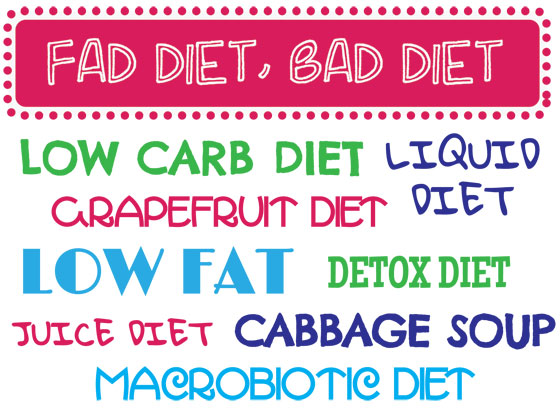How to spot a FAD diet
Image source https://blogger.googleusercontent.com/img/b/R29vZ2xl/AVvXsEj-NR6Lm1WZINLtwD_43ytyGRxNYCh47CBoSCX-9yFvWBAmCOEocQUEpnxXTf-i-Vd8moiZPLsVyOY4zbOtLUWJLbRs1fvVRQe-yPyNzMthoaEomxoSadOCW4Y2Yz18WiahJqTWWN9wWmw/s1600/FAdDiet-BAd-Diet.jpg
How many diets do you know of? Off the top of my head I can easily think of a dozen. And I think we all know someone (if not yourself) who has pretty much tried them all, yet they are still battling with their weight and struggling with their diets.
So, why are there so many diets, and why do none of them really work?
We are bombarded with marketing campaigns, endorsed with some once 'fat' individual (or celeb) who lost 100lbs and are now living the life of their dreams! Well, if it worked for them, it must work for you too right?
However, I think you know by now that basically all of these diets just dont deliver what they claim to. Why? because they are just not sustainable long-term. Yes, if you start a diet and cut calories, you will lose weight initially. But, as the weeks go on, the weight loss starts slowing down (this is because your body adapt and lowers its metabolism). You become frustrated and think, what was the point of restricting all week when I have just maintained weight, or worse gained!
You lose motivation, struggle to keep up with the diet plan, binge and you are back to square one.
Now, these quick fix diets can be very beneficial if medically or for athletic reasons an individual needs to shed weight quickly. However, these 'quick fix diets' are just designed to shed pounds quickly, NOT PERMANTLEY. Unless you are happy to live off shakes for the rest of your lives, FAD diets are just a waste of time for your long term health.
So, how do you spot a FAD diet?
-
If a diet is severely restricting calories.
I was always taught that you should never eat below you basal metabolic rate. BMR is simply a measure of energy expenditure that your body uses just to stay alive. Restricting lower than this can really mess up your metabolic rate as your body adapts and attempts to survive by burning as little energy as possible. This is why when you finally start to eat after a period of restriction, you gain weight very quickly.
-
If the diet cuts out a whole food group.
I repeat, in some cases medically this is appropriate. But, should only be done under the supervision of a dietitian or medical professional. For everyone else, we have the Eat Well Plate for a reason! You need protein, fat and carbs to function efficiently. If you dont eat a macro group, you will start to crave it and then feel bad when you finally give in. There is just no point in cutting anything out of a healthy diet. Verity is key!
-
Any diet that is ritualistic or specific.
If you can only eat certain foods or follow some crazy regimented eating schedule, this is likely a FAD. Again, this may be appropriate under certain circumstances. But for the rest, doing this is a sure fire way to lose touch with your bodys introspection, hunger and fullness signals. My advice, if your hungry just eat, if your not, dont.
Ohh yeah, and then there are super foods....
Now if you ask any dietitian they will tell you that all foods have nutritional value. Some more than others. Super foods are just foods that pack a good amount of nutrients and have been exaugurated by diet marketing. Furthermore, anything claimed to cleanse or detox is also likely to be a load of rubbish. This is as most research has found no significant long term benefits to these diets, and they never actually detox the body better than its own systems. So, the next time you are tempted in to buying them next big detox supplement. Remember that its only a marketing trick and your better off saving your money.
When you try and force yourself in to new 'healthy' habits just to lose some weight, you normally end up doing yourself more harm than good (mentally and physically). There really is not quick fix to 'perfect' health. As I have said so many times before, it is all about the small everyday choices.

Comments
Post a Comment